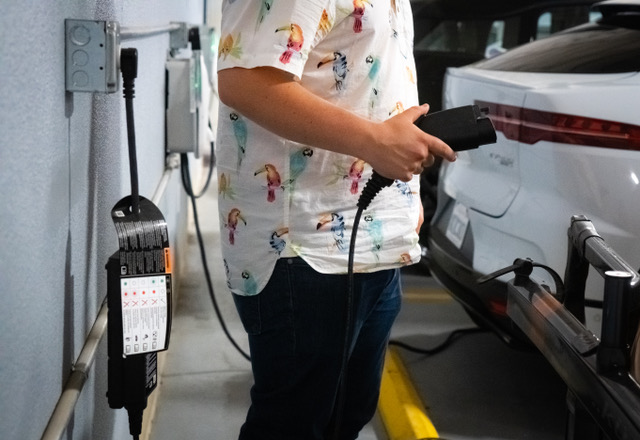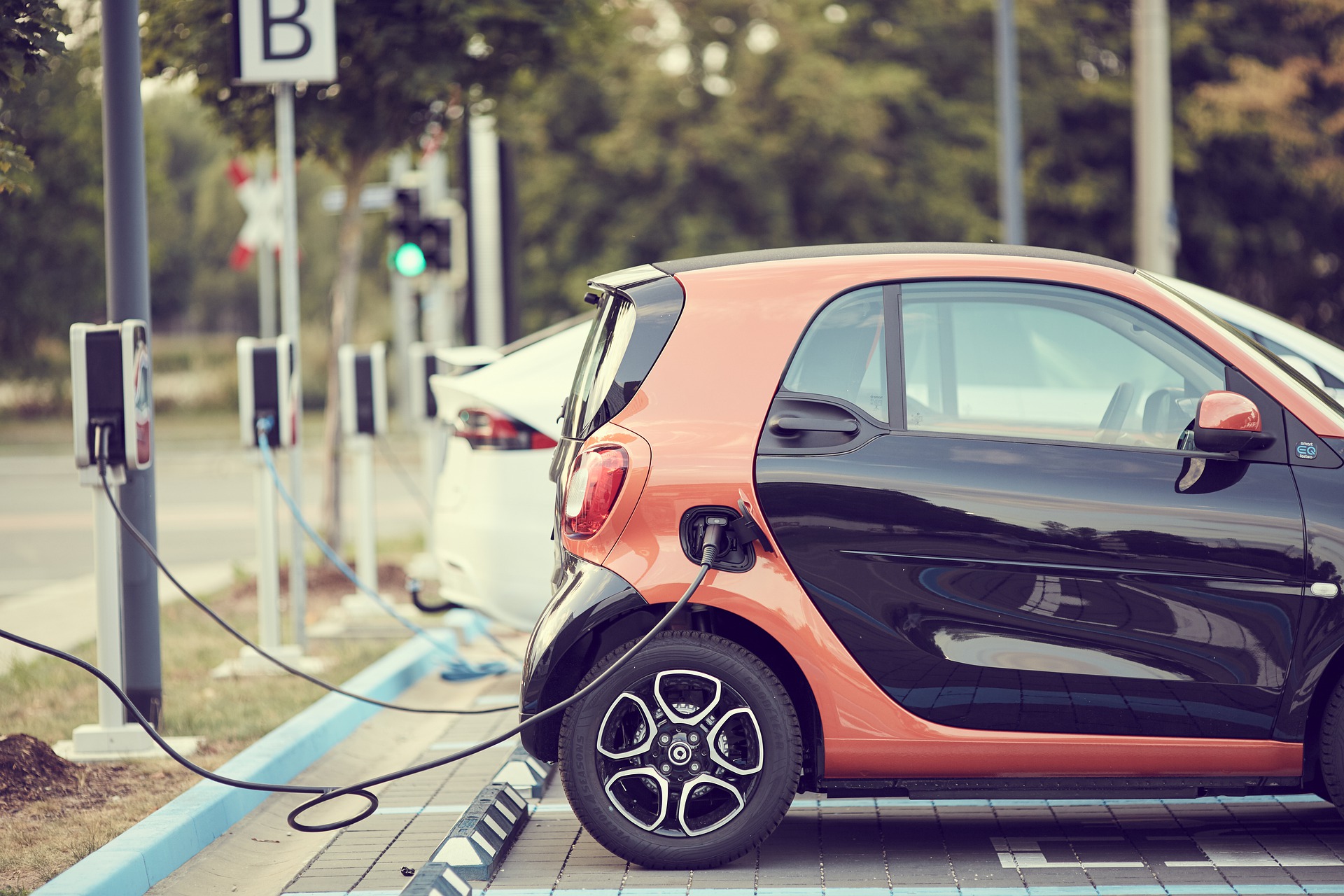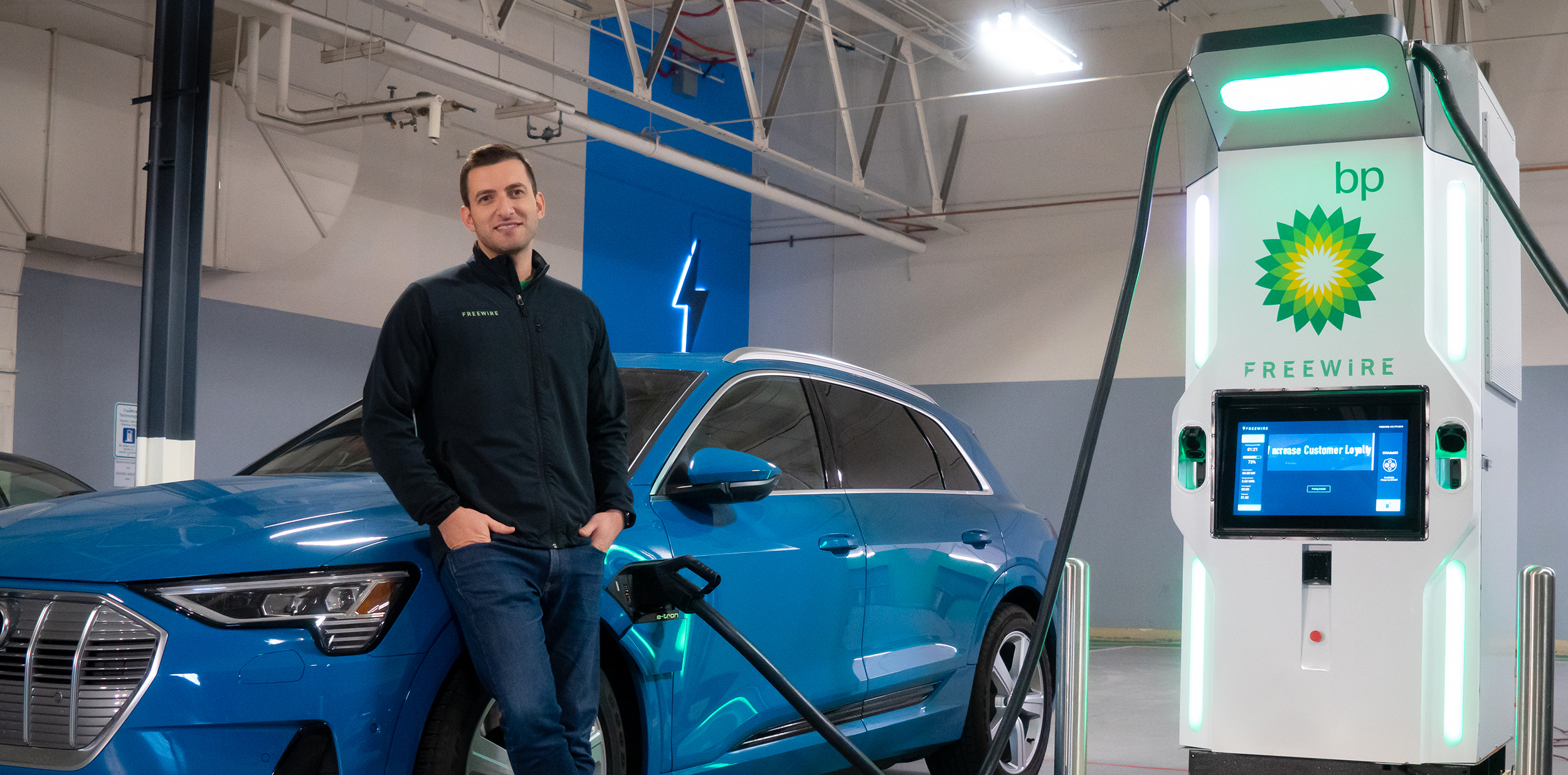What’s the Difference Between EV Charging Levels?
Most drivers are familiar with different grades of gasoline, like regular, plus, or premium. What about electric vehicles? Are there different “grades”?
Electric vehicle (EV) chargers are characterized by “levels” rather than grades. The levels describe how quickly a charger will recharge an EV’s battery. In general, chargers are defined by the number of kilowatts (kW) they output. Each kilowatt-hour (kWh) received by a standard passenger-sized EV equates to about 4 miles of driving range. The higher the output from the charger, the faster the EV battery will recharge.
The guide below is an introduction to standard charger levels: Level 1 (L1), Level 2 (L2), and DC Fast Charger (DCFC).
Level 1 Charging
Level 1 charging cord plugged into standard 120 V wall outlet
Summary: L1 is the slowest type of charging equipment. L1 chargers plug directly into a standard 120 volt (V) AC outlet supplying an average power output of 1.3 kW to 2.4 kW. This power output is equivalent to 3-5 miles of EV range per hour. An overnight charge will add 30-50 miles of range, which is sufficient for many commuters. A full charge for an empty EV battery can take over 24 hours.
Location: L1 charging occurs primarily in residential settings. There are very few L1 chargers built for public use. A majority of L1 chargers are the “emergency” cables that come standard with the purchase of an EV. Some parking garages make 120 V outlets available for charging if EV drivers supply their cable.
Cost: L1 chargers are typically included with the purchase of an EV; therefore the cost to use an L1 depends entirely on the cost of electricity at the charging location. Assuming the driver pays for electricity, an overnight charge costs approximately $1.33 (at the US average costs of electricity 13.3¢/kWh). A full charge can vary between $1.20 and $13.00 depending on the size of the EV battery and the electricity rate.
Level 2 Charging
Standard public Level 2 charger
Summary: L2 chargers operate at 208-240 V and output anywhere from 3 kW to 19 kW of AC power. This power output translates to 18-28 miles of range per hour. An average EV can be fully charged in 8 hours or less. FreeWire’s Mobi EV Charger is a mobile equivalent of an L2 charger with a power output of 5.5 kW per port and it has 2 ports that can be used simultaneously. Some L2 chargers can supply more power than what EVs can take, so results will vary depending on the charger and EV combination.
Location: L2 is the most prevalent type of charger in the United States. L2 chargers have been deployed in every state and can be found in many popular public locations, including parking garages, grocery stores, malls, and hotels. L2 chargers are popular at workspaces where employees can leave EVs charging for long durations. Many EV drivers choose to purchase an L2 charger for home use as it allows them to fully charge their EV overnight.
Cost: The price for charging at an L2 station can vary broadly. While some providers offer free charging, many public L2 chargers cost between $0.20-0.30 per kWh, which translates to about $1.00-5.00 per hour. An eight-hour charge on a public L2 will nearly fill the battery of almost every EV available. Charging an EV at home using a similar L2 charging infrastructure, will cost approximately $6.00-10.00 for a full charge. Additional installation and infrastructure are necessary for residential L2 ports.
Direct Current Fast Chargers (DCFC)
FreeWire’s Boost Charger is a battery-backed charger with a power output equivalent to higher-powered DCFC’s without necessary grid infrastructure upgrades.
Summary: DCFCs are the fastest chargers available with a maximum output of 350 kW. DCFCs are designed to fill an EV battery to 80% in 20-40 minutes, and 100% in 60-90 minutes. For example, FreeWire’s Boost Charger™ can charge a single EV up to 150 kW, delivering over 100 miles of range in 15 minutes. The maximum charge rate is often limited by the EV acceptance rate. While many EVs currently on the market charge at a maximum 50 kW, there are newer EV models capable of charging over 200 kW including the Porsche Taycan® and some Tesla models. There are very few public charging stations capable of actually delivering the highest level of power accepted by top-of-the-line EVs today.
Location: Due to their high cost and extremely high power draw, DCFCs are intended for commercial or industrial locations rather than residential. DCFCs are usually located adjacent to major interstate highways to enable EV road-trips. There are currently 15,000+ DCFC plugs in the US, but forecasts indicate that the number of DCFCs will grow significantly in the coming years.
Cost: DCFC charging sessions can be billed either by per kWh or per minute. Per kWh is the better option for most drivers because they are only charged for the energy delivered to the EV. In contrast, per-minute billing penalizes EVs that can’t accept high power rates and disproportionately bills customers who stay at the charger longer. Charging per kWh is illegal in some states because regulations in those states only allow utilities to charge for electricity. Billing rates are determined by charging networks or site hosts and can vary from $0.10/kWh to over $1.00/kWh, with an average of $0.35/kWh in the United States. Using the average rate, a full charge can vary from $10.00 to $30.00 depending on the EV’s battery size.
Summary of EV charging levels:
| Charger Level | L1 | L2 | DCFC |
| Cost per Charge | $ | $$ | $$$ |
| Speed | Slow | Medium | Fast |
| Primary Location | Residential | Residential, Public, Work | Public |
Let’s Chat
There’s more than one road you can take towards electrification. Our team is here to help you assess your options. Schedule a call for a complimentary:
- Site Assessment
- Design, Engineer, Build
- Procurement and Installation
- Marketing
- Customer Support
- Or Any Question


